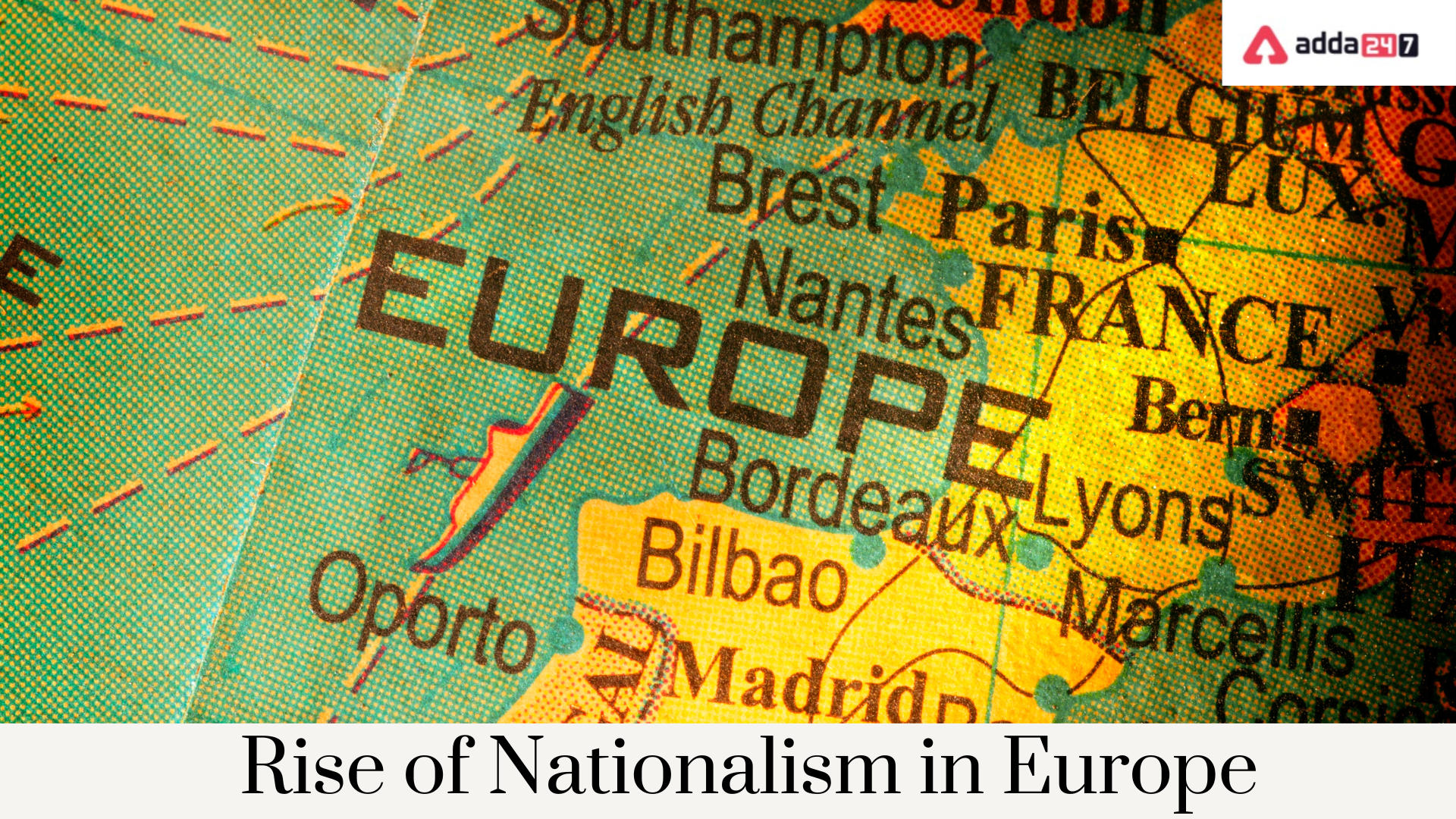Table of Contents
Nationalism in Europe Class 10 Notes
Here are some key points about nationalism in Europe for class 10 notes:
- Introduction to Nationalism:
- Nationalism is a political ideology and movement that emerged in Europe during the 19th century.
- It emphasizes the importance of a shared cultural, linguistic, or historical identity among a group of people who aspire to form their own nation-state.
- Causes of Nationalism:
- Historical Factors: Europe had a long history of diverse ethnic groups, which often led to conflicts and tensions.
- Cultural Awakening: Romanticism played a significant role in promoting cultural pride and a sense of belonging among different ethnic groups.
- Influence of Enlightenment Ideas: The ideas of liberty, equality, and fraternity inspired people to seek self-determination and political independence.
- Napoleonic Wars: The French Revolution and Napoleonic Wars spread the idea of nationalism across Europe.
- Key Nationalist Movements:
- Italian Unification: Led by figures like Giuseppe Garibaldi and Count Cavour, Italy was unified into a single nation-state in the 19th century.
- German Unification: Otto von Bismarck played a crucial role in uniting various German states into the German Empire.
- Greek War of Independence: Greece successfully gained independence from the Ottoman Empire in the 1820s.
- Irish Nationalism: Irish nationalists sought independence from British rule.
- Obstacles to Nationalism:
- Opposition from Ruling Powers: Many ruling empires, like the Austro-Hungarian and Ottoman Empires, resisted nationalist movements.
- Competition among Nationalist Groups: Different nationalist groups sometimes had conflicting interests, leading to internal divisions.
- Foreign Intervention: Major powers often intervened in nationalist conflicts to protect their interests.
- Impact of Nationalism:
- Redrawing of Borders: Nationalism led to the redrawing of European borders and the formation of new nation-states.
- Cultural Revival: It sparked cultural and linguistic revival movements, preserving local traditions and languages.
- Sense of Identity: Nationalism provided people with a stronger sense of identity and belonging.
- Legacy of Nationalism:
- Nationalism played a significant role in shaping modern Europe, leading to the emergence of nation-states.
- It also contributed to tensions and conflicts in the 20th century, including both World Wars.
- Conclusion:
- Nationalism was a powerful force that reshaped the political and cultural landscape of Europe in the 19th century.
Remember to consult your class notes, textbooks, and
Rise of nationalism in Europe- Frederic Sorrieu
- He is a French artist, who presented a series of paintings in 1848.
- He visualized his dreams, that is, a world of social and democratic republics.
- In Sorrieu’s utopian vision, the people of the world are grouped as distinct nations. They are identified through their flags and national costume.
- Leading the procession are the USA and Switzerland,which is followed by France and Germany. Following Germany are Austria, Kingdom of the two Sicilies, Lombardy, Poland, England, Ireland, Hungary and Russia.
Rise of nationalism in Europe- French Revolution
- French revolution in 1789, was the start of nationalism.
- French revolutionaries took many steps to create a feeling of collective identity:
- Innovative ideas such as Le citoyen and La Partie
- Creation of a new French flag.
- Election of National Assembly, also renaming from estate general to National Assembly.
- The administrative system which is consolidated.
- Abolishing of customs and internal duties.
- Uniform weights and measures were introduced.
- French was getting a common language.
Rise of nationalism in Europe- Napoleonic Code
- Napoleon destroyed France democracy.
- Introduction of Civil code 1804, which was called Napoleonic code.
- Features of this code are:
- Abolishing of all birth rights and privileges.
- Establishment of equality before the law.
- Security of right to property.
- Guild restrictions were removed.
Class 10 students can now join the board exam preparation batch by Adda247 and ace their board exam.
Rise of nationalism in Europe- New Middle Class
- Politically as well as socially, aristocrats were dominant as far as population is concerned.
- Peasants were the majority in the population.
- Since industrialization in England, a new social class known as working class was emerged.
- It included artisans, industrialists, businessmen and so on.
Rise of nationalism in Europe- Liberalism
- Property owning men were only given the right to vote or getting elected.
- Each and every women and property-less men were restricted from all political rights.
- It is derived from Latin word ‘root liber’, it means to be free.
- For the end of clerical privilege, autocracy the liberal nationalism was stood alive.
Rise of nationalism in Europe- A New Conservatism After 1815
- Major European powers in 1815: Britain, Russia, Prussia and Austria had defeated Napoleon.
- They use to meet in Vienna to draw up a European settlement called as treaty of Vienna.
- As per this treaty:
- Power was restored by the Bourbon dynasty.
- During the Napoleonic wars, France lost all its territories.
- 39 states of the German Confederation were formed by Napoleon, left untouched.
- On the French boundary, borders were made to prevent France from expanding.
Rise of nationalism in Europe- The Revolutionaries
Guiseppe Mazzini
- Born in Genoa in 1807.
- Was a member of secret society of carbonate.
- He established 2 secret societies: Young Europe in Berne and Young Italy in Marseilles.
- The main aim was to unify Italy in a republic.
Rise of nationalism in Europe- The Age of Revolution: 1830-1848
- Bourbon kings have overthrown to set up a constitutional monarchy in July 1830.
- Greece was struggling for independence which was a part of the Ottoman Empire.
- Greece was declared as an independent nation in Treaty of Constantinople signed in 1832.
- National feeling was the main focused area.
- German philosopher, Johan Gottfried discovered the culture in common people through music, dance and folk poetry.
- There were fewer jobs and more people.
- Due to the rise in food costs and bad harvesting, widespread pauperism in the country.
- Silesia weavers in 1845, revolt against contractors.
- Frankfurt parliament was elected in 1848. 831 elected representatives were conveyed in St. Paul Church.
The Rise of Nationalism in Europe One Shot | Class 10 History Chapter 1 | Social Science
The Rise of Nationalism in Europe notes QNA
Question. Who was the ‘Hero of two Worlds’ and what was his role in the unification of Italy?
Ans: Giuseppe Garibaldi was the ‘Hero of two Worlds’. He was born in 1807 and played important role in the unification of Italy. Two secret societies were formed: Young Italy in Marseilles and Young Europe in Berne. According to his belief, Italy wouldn’t have survived as smaller states and it needed to be unified.
Question. Explain the importance of National feeling and Imagination.
Ans: The culture was important for the development of national feelings. It was through arts, poetry, music, stories which created nationalist feelings. Glorification of science was criticized openly and it was replaced by intuitions, sentiments and emotions. This was known as romanticism aimed to create national sentiments. Language also played important role in developing national feelings.
Making of Nationalism in Europe Class 10
Question 1 How did European nationalism spread?
Ans. The French Revolution helped introduce nationalism in Europe, for it changed France’s entire system of government, defined citizens’ rights, and developed a set of national symbols. The Revolution also spread nationalism to other countries. Some foreigners embraced the new ideas.
Question 2 What is European nationalism?
Ans. Nationalism in Europe is associated with the birth of the nation state. In some countries, nationalism contributed to the formation of a state through the union of autonomous territories sharing a common culture, like in Germany or in Italy.
Question 3 What are the factors of nationalism?
Ans. The factors that influence nationalism are; educational background, social media, cultural background, involvement in organizations, parental education, parental work, and involvement in religious groups. These factors are not the final factors that influence nationalism.


 IIT JEE Advanced 2025 Increases Number o...
IIT JEE Advanced 2025 Increases Number o...
 UP Board Exam Date 2025 Class 10, 12- Do...
UP Board Exam Date 2025 Class 10, 12- Do...
 CUET Syllabus 2025 for Science Students,...
CUET Syllabus 2025 for Science Students,...





























